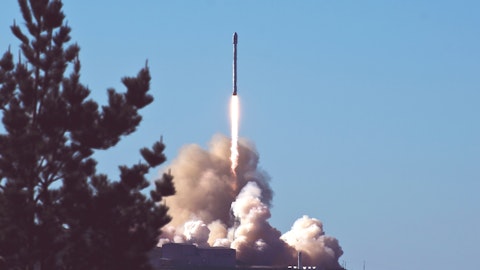Sheila Kahyaoglu: Thank you. Hi, Eric. Hi, Deanna. Thank you for taking the time. So much has been asked already, but I just wanted to kind of maybe put it all into context, if that’s possible. Eric, you could hear me, right? Just double checking?
Eric DeMarco: Yes.
Sheila Kahyaoglu: So maybe if you could just talk about KGS versus KUS in 2024 and the growth profile of each. KGS has been growing pretty nicely. Do we continue to see that outperform? And you rank – maybe if you could just simply rank order the sub-segments of where you see the highest growth there, just to start?
Eric DeMarco: Right. Right. And so to level set, the biggest growth segment we’re going to have right now for 2024, is going to be our unmanned systems business. The drones across the portfolio are doing great. And if we get a budget, we could actually beat those numbers in the drone area, right? So in KGS, I’ll let Deanna touch on those, keeping in mind that our space business will be one of the lowest ones, because it’s impacted the most by the CRA.
Deanna Lund: Yes. So as Eric had mentioned, the space business, which is our largest, is impacted by the CRA. So that is what Seth brought up. We’re expecting about a 6%, or forecasting about a 6% organic growth across KGS, with space being a big portion of that at lower than that 6%. So that would indicate that there are pieces that are growing greater than that rate, which would be our C5ISR business, our turbine business, our microwave electronics business. Really across the board, most of the businesses within KGS, with the exception of the space business, for all the reasons we’ve talked about, since we expect – to really see that growth come in, play in 2025, as we move on to production, on a number of the programs that we’ve been working on.
Sheila Kahyaoglu: Okay. Understood. And then maybe if you could talk about the pipeline. It’s stepped up $700 million sequentially, just given recent news with CCA and things like that, and you’re partnering with folks. Maybe can you give us the moving pieces of the pipeline at all?
Deanna Lund: And it’s actually, from our pipeline perspective, the big increase is not in our unmanned systems business. It’s across a number of our businesses within KGS. So in our C5 business, in our turbine business, in our microwave business.
Eric DeMarco: Sheila, the engine business in particular, the pipeline is incredible right now. Made in the USA engines, turbojets, turbofans, rocket engines, liquid and solid. We’re seeing incredible demand there in engines. That’s probably the strongest grower for us from a pipeline standpoint. Microwave electronics is incredibly strong. It grows literally every week as ordinances expended. As Deanna mentioned in the C5ISR business, I’ve been through the programs before. We have a number of programs, IBCS, IFPIC, SURE, RAD, all of which are moving into production. So those pipelines are now moving from development to production, which increases the pipeline that we’re designed in. So the KGS business, our training business, we built training systems for weapons systems. Weapons systems are back in vogue. So our training systems business pipeline – it’s very big, and its growth is one of the strongest in the company, ’24 over ’23.
Deanna Lund: As well as our space business as well. I don’t think I’ve mentioned that before. So the pipeline is up also in our space business.
Sheila Kahyaoglu: Okay. And then last question for me, obviously CapEx jumps up $20 million year-over-year. Do we think about that as a normalized rate, or is it just given what’s going on with Valkyrie and microwave products?
Deanna Lund: It goes through all the investment areas that Eric had talked about in the growth areas that we’re investing in. So it’s across the board. It’s in our microwave business. It’s Valkyries that we’re continuing to build. That’s about $20 million. But it’s also building out some of our space network, satellite network that, we company own, as well as the Manufacturing Center of Excellence for our turbine engine business. So it’s really investments that we’re making in 2024. Some of it might continue in 2025, but not at that, if we don’t anticipate at that level. So it is continuing. Yes – I would not say it’s recurring.
Sheila Kahyaoglu: Sure. Thanks.
Operator: Thank you. I would now like to turn the call back over to Eric DeMarco for closing remarks, sir.
Eric DeMarco: Excellent. Thank you all for joining us and for the Q&A session. And we’ll touch base with you, when we report Q1 in a few months. Have a good day.
Operator: This concludes today’s conference call. Thank you for participating. You may now disconnect.
Follow Kratos Defense & Security Solutions Inc. (NASDAQ:KTOS)
Follow Kratos Defense & Security Solutions Inc. (NASDAQ:KTOS)
Receive real-time insider trading and news alerts




